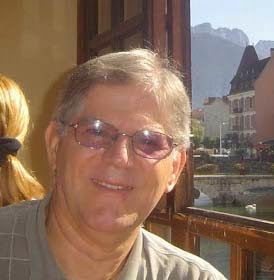
I did some TV channel surfing while in Holland recently. The news showed the massive anti-gay marriage demonstrations in Paris. French President Francois Hollande had just proposed legalizing gay marriage. A few days later, hundreds of thousands of Frenchmen marched down the Champs Elysées AGAINST this.
Isn’t this interesting? In the US, 10 states have legalized gay marriage. In Europe, 8 out of 50 countries have done so. As to the pending US Supreme Court decisions regarding California’s Proposition 8 and DOMA, who knows...For now, it appears that the US and Europe are just about tied for bigotry.
Then there is capital punishment. Still channel surfing, I saw this British asshole being interviewed on a Dutch talk show about the death penalty in the US. The man was pontificating and smiling smugly at his own jokes. He had just returned from “the States,” 37 of which still execute people, he claimed (wrong: it’s only 31, and many, like California, stopped executing many years ago, even though capital punishment is still on their books).
This man recounted how he, while arguing about the death penalty with a group of Americans, quoted Shakespeare’s Merchant of Venice - the well-known words about “a pound of this poor merchant’s flesh...” Imagine, he said: Those red necks didn’t have a clue as to who the Merchant of Venice or Shakespeare were. So when he argued about the death penalty again with another group of Americans a few days later, he used the same quote, but now he attributed it to the Bible. And lo and behold, he said, that group liked the quotation a lot.
The guest and the moderator of the TV talk show both found this hilarious. They concluded that if you want Americans to appreciate something, all you have to do is to translate it into Biblical language.
I found this extremely aggravating. As a Northern Californian, I object to stupid generalizations that put me in the same boat as fundamentalist hillbillies from Appalachia. Do I tell my friends in Amsterdam that Europeans are primitive, superstitious, frequent thieves, and that they often sympathize with racist and dictatorial policies, because these things are not uncommon in other parts of Europe - places like Albania, Belarus, Georgia, Moldova, Russia, Serbia or Ukraine?
I was in Europe also when Venezuelan dictator Hugo Chavez died. The media showed the adulation and the deification of this deeply flawed individual, and the crocodile tears of dignitaries attending the funeral, including nutcases like Ahmadinejad.
My hunch is that the American media reported this event more critically. I mean, okay, it’s understandable that millions of South Americans cried. I suppose Chavez has done something for the dignity of the lower classes. To his credit, he didn't spend all of the oil money on lining his own pockets, as other dictators have. He is said to have improved public health. But all in all, the bad outweighs the good. Like Peron, Chavez was charismatic and at the same time bad for his country. It’s not true that things have improved in Venezuela. Despite new oil wealth, the economy is worse now than it was in the 1960s. The rates of crime and kidnaping are perhaps the highest in the world. Venezuela has 20,000 murders per year, vs. 16,000 in the US, with ten times its population! But I digress. I just wanted to show media bias.
To their credit, most of my Dutch friends were also aggravated by this display. They did not glorify Chavez.
One night, I was returning home from Amsterdam by train. I noticed that I was the ONLY passenger reading a newspaper. Not one single solitary person was reading anything - not a book, not a magazine, not a paper, not even a Kindle or some other tablet. IPhones and androids, yes. A majority of the people (many young ones) around me were texting or toying with their little machines. And there was at least one very annoying woman talking very loudly on her phone, convinced that her private life was everyone’s business.
I had the same experience at the airport and in other public arenas.
But again, this is not to rag on Europeans: This is the world, today. Same thing in the US.
One day, I drove down to Liege. I was stunned by the demographics of this mid-size Belgian city:
Practically everyone was a foreigner. I saw practically zero Belgians. Everyone was from Congo, from Algeria, from Serbia, from Ukraine, from somewhere else. When I am in Paris, London or Amsterdam, I am no longer surprised by the ethnic “diversity.” But Liege, a provincial town of fewer than 200,000 people, turned out to be more alien than any other European city I have ever visited. Now don’t get all huffy on me and start accusing me of racism: I am not making a value judgment about this demographic transition. All I am saying is that Europe is indeed undergoing a profound demographic transition, and that I just glanced at a vivid vignette of it.
The weather was miserable throughout most of my stay. Snow, freezing sleet, sub-freezing temperatures every day (see above picture of yours truly). Still, you can’t beat the joy of strolling around Amsterdam. One afternoon, I was walking along a canal in the Jordaan, one of the city’s old, picturesque enclaves inhabited for centuries by a staunchly proud people. I came by an American busker. The thirty-something guy was belting out a song that reminded me a little bit of The Band, somewhat country style. Despite the frost, he managed to pluck at his guitar with dexterity. Later, he told me that he was from Florida
and that he didn’t have the money to get back home. He was stuck in Amsterdam. I wasn’t sure whether to pity him or to envy him.
leave comment here
Youtube
Contact Form
Popular Posts
-
By Madeleine Kando Flying is like signing away your rights as a human being. Not only is your life put on hold, but you never know which sid...
-
by Madeleine Kando We left Boston early Sunday morning, the day before the 2024 Solar Eclipse. We have friends who live close to the Canadia...
-
By Tom Kando Only one thing aggravates me more than the mistakes of the electorate - as exemplified by the Democratic loss in Massachusett...
-
Tom Kando Some societies are more successful than others. Today, there are successful societies such as Australia, Canada and Scandinavia,...
Tom's Publications and Essays
Madeleine's Publications and Essays
interesting links
Publish Your Article!
A valid author name is required. We will create live links to url's that you specify in your post. Please be patient, and allow us some time to read and approve your article.We reserve the right to refuse any articles that are not deemed appropriate for this blog.








